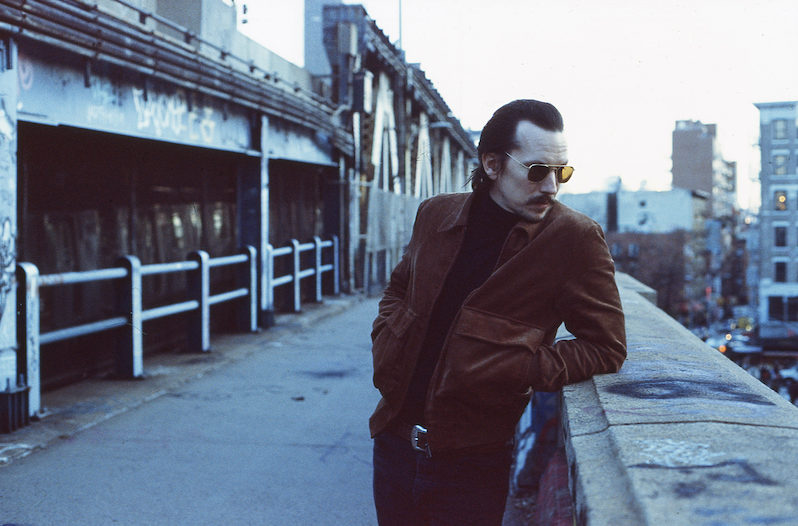Zephaniah OHora gets classic country music, from the streets of Bakersfield to the bygone dancehalls of Texas and the off-Broadway honky-tonks of Nashville.
Videos by Wide Open Country
It turns out that the Brooklyn, New York-based singer-songwriter grasps the meaningful storytelling from nearby Greenwich Village as well, based on bold social statement "All American Singer."
First dreamed up on the heels of 2016 and reaching ears this election year, "All American Singer" highlights new album Listening to the Music (out August 27 on Last Roundup Records), the follow-up to OHora's critically-acclaimed 2017 release This Highway.
OHora's Dylanesque (or, if you prefer, Tom T. Hall-esque) moment digs into our current situation as a study on the ugliness of human nature and the contentiousness of a time when few acknowledge any sort of middle ground between the left and the right.
"They're rolling out big plans today, passing laws to change what you can say. And at home we're fighting in the streets, over politics and the way things used to be," OHora sings in a song that favors sadness about our current predicament over anger against a particular side.
"My main thing was I think everyone has their own mission or their own calling," OHora says. "For some people, maybe they want to rant on Twitter and use their platform as an artist to call out groups of people or belief systems or what have you. Then there's some of us like myself that I'd rather not build up any walls against people that I don't agree with because maybe there's some sort of common ground we can find or something I can learn, even though I'm stubborn and have my views on things. If I can't have a conversation about it with anybody, what's really the point?"
Most articles about OHora marvel that someone from New York City could write "Black & Blue," "We Planned to Have It All" and other songs comparable to the work of Merle Haggard, Waylon Jennings, Kris Kristofferson and other country storytellers whose blue collar grit remained intact after their financial situations surpassed blue collar status.
Of course, no part of the country (or time frame within country music history) corners the market on songs that are honest, real or good. And it's not like OHora needed to go on a pilgrimage outside of NYC to find truck driving country albums in thrift stores or to participate in jam sessions any better than the ones he's taken part in at Brooklyn honky-tonk Skinny Dennis.
Besides, many of us from across the nation rented a particular animated film before our teenage listening preferences took shape or the internet hipped us to Roger Miller deep cuts.
"I only realized just a couple of years ago that the Disney film Robin Hood... That movie was one of my favorite movies as a child, and one of the things when I think back that I love about that movie was the music," he says. "The character that was the rooster that played a stringed instrument introduced the film with a tune where he whistled. It turns out that's Roger Miller, which I figured out five years ago or so."
OHora and the late producer Neal Casal recorded Listening to the Music at Brooklyn's Bunker Studio in 2019. Their supporting cast included engineer Aaron Nevezie, background vocalist Dori Freeman, pedal steel wiz Jon Graboff, pianist Roy Williams and one of traditional country music's best friends, harmonica player Mickey Raphael.
It was the final recording project for Casal, the former Blackfoot guitarist and Ryan Adams collaborator who committed suicide on Aug. 26, 2019. He was only 50 years old.
The album arrives just over a year after Casal's passing, which drives OHora's mission to raise awareness for suicide prevention.
"There's been an uptick in that, and thankfully there's a lot of good organizations like MusiCares that are trying to deal with that," he says of suicides within music communities. "There's so many elements coming in, like the devaluation of music through streaming. It's already been a tough business anyway. You throw that in, and people have to road dog it and tour to make money. That presents all sorts of problems with addiction and struggles. We don't really know why this is happening, but it's important to have this conversation."
Causes championed by OHora include the Neal Casal Music Foundation. Per its website, the non-profit "will provide music instruments and lessons to students in New Jersey and New York state schools where Neal was born and raised, as well as, make donations to much needed mental health organizations that support musicians in need."
Read More: Zephaniah OHora's 'This Highway' is Classic Country Perfection
Beyond helping those facing mental crises, OHora simply wants to remind us that great music can drown out just about anything in a year dragged down by a pandemic with no end in sight and one of the most polarizing presidential elections on record.
"Obviously there's sad love songs because that's part of life, but to me, it's more a celebration of music," OHora says of Listening to the Music. "The title track highlights that collecting records and listening to records and hearing people play or playing music myself has always been a place for me to return and find some peace and joy, even if I'm having hard times."
Now Watch: Songs Every Terri Clark Fan Knows By Heart
https://rumble.com/embed/u7gve.v490kd/




